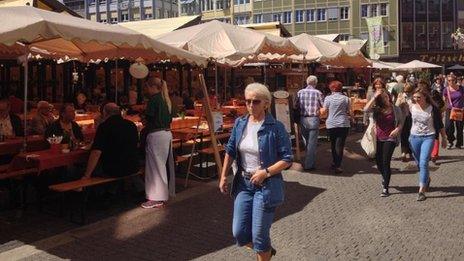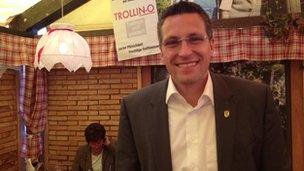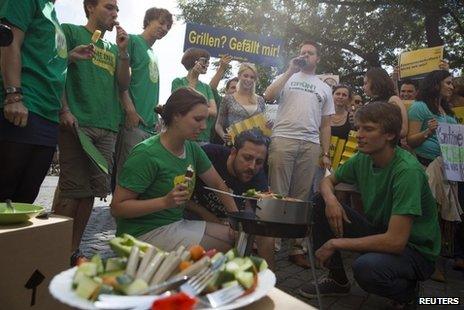Germany's Greens divided over coalition with Merkel
- Published

The "realist" wing of the Greens is strong in affluent Stuttgart
The Green Party could end up as kingmaker after Germany's election - but would it dare switch its traditional allegiance with the left?
The smell of sizzling sausage is everywhere at Stuttgart's wine festival. It is a warm day, and the atmosphere is relaxed and convivial.
But Dr Kai Schmidt-Eisenlohr, a representative of the Green Party in Baden-Wurttemberg state, laughs nervously when questioned about his party's general election manifesto and its call for public canteens to have a meat-free day each week.
"I'm not a vegetarian, I like my steak," he says, explaining that the policy is a way of promoting a healthier, more sustainable lifestyle.
Some of the media coverage of the pledge may have been less than complimentary, but it has not dented the Greens' popularity in the run-up to Germany's general election on 22 September.
'We've changed'
The collapse in support for the liberal, pro-business Free Democrats (FDP) - the junior partner in the governing coalition - has put the Greens into third place, with polls predicting the party may win 10-12% of the vote.

Kai Schmidt-Eisenlohr says the Green Party is now in the centre
There has been speculation about whether the Green Party, which has its roots in radical socialism, might find itself joining a coalition with Angela Merkel's right-of-centre Christian Democrat party (CDU), which is expected to come a clear first.
In 2011, when the Greens took control of the state government in Baden-Wurttemberg, they overturned 58 years of CDU rule.
Since they have run the state and the city council too, the party has tried to reform the education system and to increase public participation in decision-making. It has had mixed success, and their critics accuse them of trying to do too much.
But Dr Schmidt-Eisenlohr argues the party's appeal is widening, because it has changed dramatically from its origins as an anti-nuclear protest movement in the 1980s.
"We have changed. That doesn't mean that we forgot where we are coming from. It's just, when you want to change a society, the real change can only come when you are in power. We are absolutely in the middle now."
Certainly, with his suit and clean-cut image, Kai Schmidt-Eisenlohr looks like a fully paid-up member of the educated middle class, which he freely admits he is - but while he does not rule out a coalition with the CDU one day, he says it is too early for the party to make that leap now.
'Urban and rich'
The Green Party's journey to the political mainstream began in the 1990s, when it joined a national coalition government with the left-of-centre Social Democrats (SPD).

The Greens' meat-free-day suggestion has caused a storm in Germany
More recently, Angela Merkel's decision to close all of Germany's nuclear reactors by 2022, in the wake of the Fukushima nuclear disaster in Japan, transformed one of the Greens' key policies into government policy.
The party remains committed to a shift towards renewable energy and supports measures to increase equality.
In fact, the party has changed so much, and much of its environmental agenda has become so widely accepted in Germany, that Dr Knut Krohn of the Stuttgarter Zeitung newspaper argues the Green Party in the south has become a "conservative-social" party.
He says the people who vote for the Greens here are rich, urban and educated. "They can afford to think about the environment," he says.
He adds they often live in big houses and drive big cars, a situation he describes as absurd.
But Dr Krohn contrasts that with Berlin and northern Germany, where he says the Green Party remains firmly on the left, and leader Juergen Trittin has ruled out the possibility of a coalition with Angela Merkel's CDU at the national level, should the arithmetic demand it.
These are the two competing wings of the Green Party - the more flexible realos and the hardline fundis.
Back at the wine festival, there is support for the Greens at a local level, but scepticism about how their local success might translate to the national stage.
One man, looking after a baby, says that in Baden-Wurttemberg, the people are rich enough to support the Greens. But he adds, ominously, that if the economy takes a downturn, things could change.
"When the party's over, the Greens will go away."